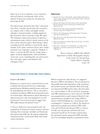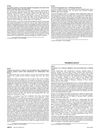 11 citations,
February 2013 in “Clinical Endocrinology”
11 citations,
February 2013 in “Clinical Endocrinology” A small number of premenopausal female blood donors had high prolactin levels, often due to stress, and retesting is recommended to prevent misdiagnosis.
[object Object]  June 2021 in “Archives of Advances in Biosciences”
June 2021 in “Archives of Advances in Biosciences” Finasteride reduces sperm count and quality and alters hormone levels in mice.
 37 citations,
February 2013 in “Maturitas”
37 citations,
February 2013 in “Maturitas” Testosterone therapy is beneficial for women's health and does not cause masculinization or liver damage, and it protects the heart and breasts.
 2 citations,
August 2011 in “Revista Medica De Chile”
2 citations,
August 2011 in “Revista Medica De Chile” A postmenopausal woman's high testosterone levels and symptoms improved after removing a tumor from her ovary.
 14 citations,
May 2012 in “Endocrine Research”
14 citations,
May 2012 in “Endocrine Research” The same hormone can affect gene expression differently in various tissues, which could lead to new treatments for conditions like hair loss.
 7 citations,
May 2012 in “International Journal of Andrology”
7 citations,
May 2012 in “International Journal of Andrology” The new oral testosterone pill normalized testosterone levels and lowered SHBG in men with low testosterone.
 October 2020 in “Journal of Pharmaceutical Sciences”
October 2020 in “Journal of Pharmaceutical Sciences” Topical finasteride with EGCG or TA improves drug release and dermal uptake, potentially treating hair loss effectively.
 1 citations,
January 2016 in “Journal of stem cell research and medicine”
1 citations,
January 2016 in “Journal of stem cell research and medicine” Fat-derived stem cell therapies can potentially increase hair growth and thickness in people with hair loss.
 13 citations,
October 2011 in “Clinical Obstetrics and Gynecology”
13 citations,
October 2011 in “Clinical Obstetrics and Gynecology” Women with PCOS-related infertility can often conceive with treatments like clomiphene and metformin, but managing pregnancy complications is important.
 44 citations,
October 2010 in “BJUI”
44 citations,
October 2010 in “BJUI” 5-α-reductase inhibitors reduce prostate cancer risk but may cause sexual dysfunction and don't affect high-grade tumor or death rates.
 18 citations,
May 2014 in “Menopause”
18 citations,
May 2014 in “Menopause” A 5 mg dose of transdermal testosterone cream effectively restores testosterone levels in postmenopausal women.
 36 citations,
December 2012 in “Dermatologic Surgery”
36 citations,
December 2012 in “Dermatologic Surgery” Injecting platelet-rich plasma (PRP) can increase hair growth rate and density in male pattern baldness.
 24 citations,
March 2003 in “Best Practice & Research Clinical Endocrinology & Metabolism”
24 citations,
March 2003 in “Best Practice & Research Clinical Endocrinology & Metabolism” Androgens, male hormones, play a role in both men and women's health, and testosterone therapy can help women with low levels, but it's not suitable for pregnant or lactating women, or those with certain conditions.
 74 citations,
January 2015 in “Asian Journal of Transfusion Science”
74 citations,
January 2015 in “Asian Journal of Transfusion Science” Platelet-rich plasma (PRP) injections can effectively increase hair density and thickness in people with androgenic alopecia, without major side effects.
 5 citations,
May 2020 in “Pharmaceutical Research”
5 citations,
May 2020 in “Pharmaceutical Research” Heat and chemicals improve finasteride delivery to scalp and hair follicles, potentially enhancing treatment for hair loss.
January 2020 in “Global dermatology” The growth factor cocktail significantly increased hair growth in patients with androgenetic alopecia.
 8 citations,
March 2020 in “Metabolites”
8 citations,
March 2020 in “Metabolites” Finasteride treatment changes urine metabolomics and steroid signatures, potentially monitoring effectiveness but may cause sexual side effects.
 34 citations,
September 2013 in “Urology”
34 citations,
September 2013 in “Urology” Long-term use of a certain medication can worsen erectile function in aged rats by damaging penile muscle cells.
 May 2023 in “IntechOpen eBooks”
May 2023 in “IntechOpen eBooks” More research is needed to understand how testosterone is maintained in adult males.
 26 citations,
March 2014 in “Arquivos Brasileiros De Endocrinologia E Metabologia”
26 citations,
March 2014 in “Arquivos Brasileiros De Endocrinologia E Metabologia” The document concludes that proper diagnosis and combined treatments are key for hirsutism management, and weight loss may help overweight patients.
 180 citations,
July 1973 in “The New England Journal of Medicine”
180 citations,
July 1973 in “The New England Journal of Medicine” Minoxidil effectively lowers blood pressure with few side effects.
 February 2013 in “Journal of The American Academy of Dermatology”
February 2013 in “Journal of The American Academy of Dermatology” Oral propranolol successfully treated a baby's skin growth and ulceration linked to PELVIS syndrome.
 215 citations,
November 2006 in “Journal of The American Academy of Dermatology”
215 citations,
November 2006 in “Journal of The American Academy of Dermatology” Dutasteride more effective for hair growth, but has more side effects than finasteride.
7 citations,
August 2020 in “Plastic and reconstructive surgery. Global open” QR 678 and QR 678 Neo are safe and promote hair growth, potentially helping chemotherapy-induced hair loss.
 8 citations,
July 2019 in “Endocrine connections”
8 citations,
July 2019 in “Endocrine connections” Finasteride affects SRD5A2 gene pattern, possibly causing lasting side effects.
 December 2018 in “Actas urológicas españolas”
December 2018 in “Actas urológicas españolas” 5-alpha reductase inhibitors may have additional effects on cancer, mental health, heart health, and hormone levels beyond treating prostate enlargement.
[object Object] June 2022 in “Conjunctions” YouTube videos of men using Finasteride and Minoxidil for hair and beard growth form a unique self-tracking genre that helps build community and shape male identity.
 2 citations,
April 2016 in “The Journal of Urology”
2 citations,
April 2016 in “The Journal of Urology” Finasteride 1mg linked to diverse symptoms; other treatments improve erectile function in rats.
1 citations,
January 2022 in “Journal of Drug Delivery Science and Technology” The optimized microemulsion with cinnamon oil effectively delivers finasteride through the skin without damaging hair.
1 citations,
January 2022 in “Annals of Dermatology” Dutasteride is more effective than finasteride for long-term hair growth in men with androgenic alopecia.

























